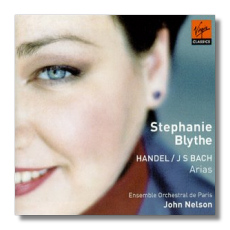
The Internet's Premier Classical Music Source
Related Links
- Latest Reviews
- More Reviews
-
By Composer
-
Collections
DVD & Blu-ray
Books
Concert Reviews
Articles/Interviews
Software
Audio
Search Amazon
Recommended Links
Site News
 CD Review
CD Review
Stephanie Blythe

Sings Arias
- George Frideric Handel:
- Xerxes, HWV 40 - Frondi tenere…Ombra mai fù
- Hercules, HWV 60 - Where Shall I Fly
- Semele, HWV 58 - Awake, Saturnia…Iris, hence away
- Giulio Cesare in Egitto, HWV 17
- Al lampo dell'armi
- Dall' ondoso periglio…Aure, deh, per pietà
- Priva son d'ogni conforto
- Madre!…son nata a lagrimar
- Johann Sebastian Bach:
- St. Matthew Passion, BWV 244
- Erbarme dich, mein Gott
- Konnen Tranen meiner Wangen
- St. John Passion, BWV 245
- Von den Stricken meiner Sunden
- Es ist vollbracht!
- Mass in B minor, BWV 232 - Agnus Dei
Stephanie Blythe, contralto
Ensemble Orchestral de Paris/John Nelson
Virgin Classics 5 45475 2 DDD 71:45
Although comparisons are odious, Stephanie Blythe, a winner of the Richard Tucker Award, bids fair to be the Marilyn Horne of her generation. In just a few years, she has made her mark in recital, in oratorio, and on the operatic stage, singing everything from Handelian heroines (and heroes!) to the title role in Bizet's Carmen.
This CD contains repertoire I associate more, however, with another great mezzo-soprano of the recent past: Janet Baker. Blythe combines Baker's gravity and excellent taste with Horne's temperament, and with the flexibility and rich beauty of Horne's voice. "Iris, Hence Away" from Handel's Juno is a fine opportunity for her to display her agility, as is "Al lampo dell'armi" from Giulio Cesare. These two arias, with "Where shall I fly?" from Hercules, establish Blythe as a hard-working diva who believes that creating credible characters is just as important as letting out a torrent of beautiful sounds. Because it is the first selection on the CD, most listeners probably will start with Blythe's "Ombra mai fù" from Serse – the famous Largo. Throughout her range, Blythe sings with evenness and sweet assurance; her voice is like the kind shade of the tree that she sings about in this aria.
In the Cornelia/Sesto duet from Giulio Cesare, Blythe is joined by counter-tenor David Daniels. (It is curious to hear a grown "son" singing higher than his mother!) Individually, Blythe and Daniels are impressive; together, they give a bravura reading of this passionate duet.
The Bach selections – five slowish sacred arias in a row – would challenge any performer to maintain variety. If Blythe isn't wholly successful, it's really not her fault. Listeners may choose to break up the Bach half of this CD on their own, unless they wish to indulge themselves with thirty continuous minutes of intense spiritual contemplation wedded to gorgeous singing.
Stylistically, this CD is a neither-fish-nor-fowl proposition; it falls between strict authenticity and unabashed modernism. Blythe's singing will please most period performance fans, but the accompaniments are not entirely consistent examples of "correct" and effective Baroque style. For the most part, the instrumental playing is good, but Blythe's singing is better.
There are texts and translations, and a good essay. The recording was made in a Parisian church (the Église Notre-Dame du Liban), and fortunately the warm sound is not swallowed in reverberation.
This would be a nice present for Bach or Handel fans.
Copyright © 2001, Raymond Tuttle


















